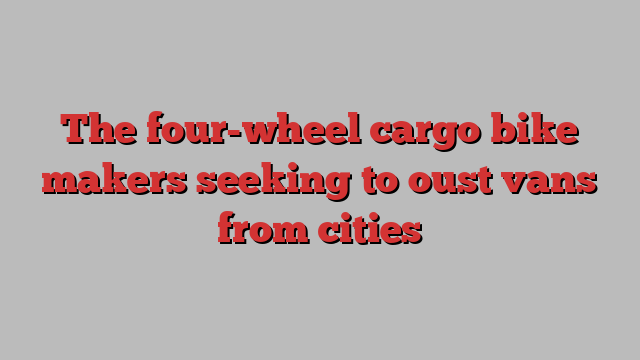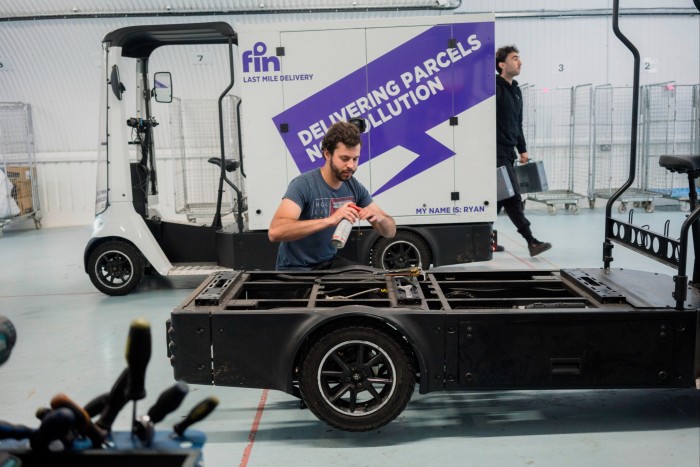
The assembly area in the Electric Assisted Vehicles factory, in the English town of Banbury, resembles a small-scale car plant. There are four-wheel chassis and orange bins for components. But each vehicle has a set of bicycle pedals, linked by a chain to the rear axle.
The Banbury site is one of a growing number across Europe manufacturing quadracycles — zero-emission, four-wheel cargo bikes used on the streets of big cities. Thanks to electric assistance and the latest powerful motors and batteries, the vehicles can typically handle loads of more than 150kg at up to 25km/h (15.5mph). They are still subject, however, to only the relatively light regulation surrounding bicycles.
Manufacturers across Europe have rushed to develop the novel machines since EAV invented the category in 2019. EAV chief executive Chris Temple hopes that the nascent sector can persuade van users that quadracycles make better economic, ecological and practical sense. Among the vehicles under construction recently was one tailored for collecting litter from bins in the London borough of Hammersmith and Fulham.
“What we’re trying to do is work with our customers to maximise their efficiency,” said Temple.
Annual demand across Europe for quadracycles could soon reach at least tens or hundreds of thousands of units annually, according to Kersten Heineke, the partner responsible for management consultancy McKinsey’s Center for Future Mobility in Europe. Some large delivery companies, including UPS and Amazon, have ordered hundreds of the vehicles.
Heineke said that, with adjustments to the loading and delivery “turns”, quadracycles could supplant large numbers of vans. Each quadracycle costs about a quarter of the £50,000 for a new, electrically-powered van, while quadracycles require less elaborate charging points.
“It’s a competitor to a small van but also to a large van, if you change the way you design the turns,” Heineke said.
But the key challenge for the sector, Heineke and others said, was to improve product reliability. Some manufacturers are having to revise their initial designs heavily after finding they struggled with the heavy demands of commercial business-to-business use.
“The traditional bicycle industry simply doesn’t have components that are B2B ready,” said Heineke.
Both the opportunities and challenges were clear visiting the east London delivery hub of Fin Sustainable Logistics, a sustainable delivery start-up, under a railway arch in Bethnal Green, east London.
Although the company uses electric vans for some deliveries in outer London, its inner London trips are made with a fleet of more than 100 quadracycles. The company, established in 2022, handles thousands of parcels daily for e-retailers and other companies ferrying products to their end customers.
Fin settled on quadracycles from a manufacturer called Fernhay after previously using machines built by EAV and testing equipment from Estonia’s Vok and Germany’s Mubea.
Fernhay started as a development project in the UK arm of the US’s UPS delivery company and manufactures its machines in Turkey through a partnership with bus manufacturer Temsa. It is privately held and chaired by Bill Wachtel, a veteran US automotive executive.
Fin founder Rich Pleeth said the company opted for quadracycles because of the growing restrictions on motor vehicles, including low-traffic neighbourhoods, where through motor traffic, but not cycling, is banned.

“We looked at the most efficient vehicle we could use on the cycling infrastructure but also use LTNs and park anywhere,” Pleeth said. “You can imagine the amount of time a van spends parking.”
Pleeth expressed admiration for the high standards of Mubea’s products but said his company chose Fernhay for its safety features, robustness and high, 250kg cargo capacity. Fernhay was also able to offer rapid delivery of bikes, thanks to the large capacity of Temsa’s factories, he added. Fin expects to purchase about 500 quadracycles next year.
“They can ramp up production to thousands per month,” Pleeth said.
However, Fin’s experience also highlighted the sector’s reliability challenges.
Pleeth said his company had decided against buying Vok’s quadracycles partly because the company used non-standard parts that it had developed for itself, something Vok said it had been obliged to do to ensure they were sufficiently tough.
Fin returned its EAV machines, meanwhile, after suffering multiple broken wheels and chassis.
In Banbury, Temple accepted past poor reliability had cost EAV leadership in the sector. He said Mubea — part of a large, German automotive parts group — was now market leader. “I would say we’re an aggressive follower,” Temple said.
He insisted that a new, modified design, with alloy metal wheels and a stronger chassis, had addressed the difficulties, however. Temple, a former manager at UK sports car manufacturer Aston Martin, was brought in this year by Taiwan’s TPK, EAV’s largest shareholder, to address such issues.
“We’re applying automotive principles to make the product as efficient and robust as possible,” Temple added.
Heineke said reliability would shape the sector’s future. “The companies that are ultimately going to win . . . are those that can get a largely maintenance-free vehicle,” he said.
Yet both Pleeth and Temple expressed optimism the sector could grow fast.
Pleeth said his quadracycles could handle about 90 per cent of deliveries in London. “We’re not going to be delivering your new marble table or your couch,” Pleeth said. “But we are going to be delivering your cosmetics, your toilet paper and your flowers.”
Temple meanwhile said that EAV should in future be able to “flood” the market with reliable quadracycles.
“My aspiration is to remove as many large-capacity diesel vans as possible, replacing them with cargo bikes,” he said. “It’s better for everybody.”